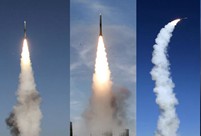

Construction of the Chinese section of the China-Russia East-Route Natural Gas Pipeline began on Monday, further boosting energy cooperation between the two countries, analysts said.
The Chinese section of the 3,968-kilometer east-route natural gas pipeline originates in northeast China's Heilongjiang Province and terminates in Shanghai in the east.
It is the largest China-Russia cooperation project and is conducive to diversifying both countries' energy strategy and guaranteeing energy security, Chinese Vice Premier Zhang Gaoli said at the construction commencement ceremony.
The Russian part of the east-route pipeline began construction in eastern Siberia last September. Negotiations on details for a proposed western route are still underway.
"The construction progress of the east route of the pipeline is of great strategic significance. It lifts China-Russia mutual trust and cooperation to a new height," said Professor Liu Yijun with China University of Petroleum.
China National Petroleum Corp (CNPC) and Russian gas giant Gazprom signed a deal for the East-Route Gas Project on May 21, 2014. The 30-year contract will see the east-route pipeline begin providing China with 38 billion cubic meters of natural gas annually from 2018.
Under the bilateral agreement, Russia will export 70 billion cubic meters of natural gas to China every year upon completion of both the east- and west-route gas pipelines.
Strengthening energy cooperation is of great significance to safeguarding the two countries' energy security, said Zhou Dadi, vice director of the China Energy Research Society.
Russia's energy export to Europe is under great pressure due to the impact of the Ukraine crisis, making it look to the east for a solution, said Feng.
To reduce its reliance on coal and combat pollution, China also needs to import more natural gas, he added.
The gas project is a win-win deal for both countries, said Feng Yujun, head of the Russia Research Institute of China Institutes of Contemporary International Relations.
"The pipeline will provide secure and reliable clean energy for China's economic development and a long-term stable market for the rich natural gas resources in Russia," he said.
The pipeline is also of great significance for the rejuvenation of the traditional industrial base in northeast China and Russia's development of the Far East, Feng added.
Aside from natural gas, the two countries should fully utilize the their complementarity advantages to expand all-round cooperation in oil, nuclear energy, coal and electricity.
 4-year-old cute 'monk' spends summer holiday in temple
4-year-old cute 'monk' spends summer holiday in temple College graduates shining on the red carpet in Nanjing
College graduates shining on the red carpet in Nanjing PLA soldiers launch guided missiles in confrontation exercise
PLA soldiers launch guided missiles in confrontation exercise One woman’s fight against dog eaters
One woman’s fight against dog eaters Beautiful and smart - post-90s college teacher goes viral
Beautiful and smart - post-90s college teacher goes viral Top 10 luxury houses in the world
Top 10 luxury houses in the world  National Geographic: best photos during journey
National Geographic: best photos during journey Couples who engage in meaningful and deep conversations are happier
Couples who engage in meaningful and deep conversations are happier Maldives resort rated best hotel of 2015
Maldives resort rated best hotel of 2015  Through AIIB, China can learn to lead
Through AIIB, China can learn to lead Greece shuts banks as default looms, closer to euro exit
Greece shuts banks as default looms, closer to euro exit Xi'an 'Superman'shines a light on the city's errand runners
Xi'an 'Superman'shines a light on the city's errand runners Pole dancers challenge dog meat festival with provocative photo series
Pole dancers challenge dog meat festival with provocative photo seriesDay|Week